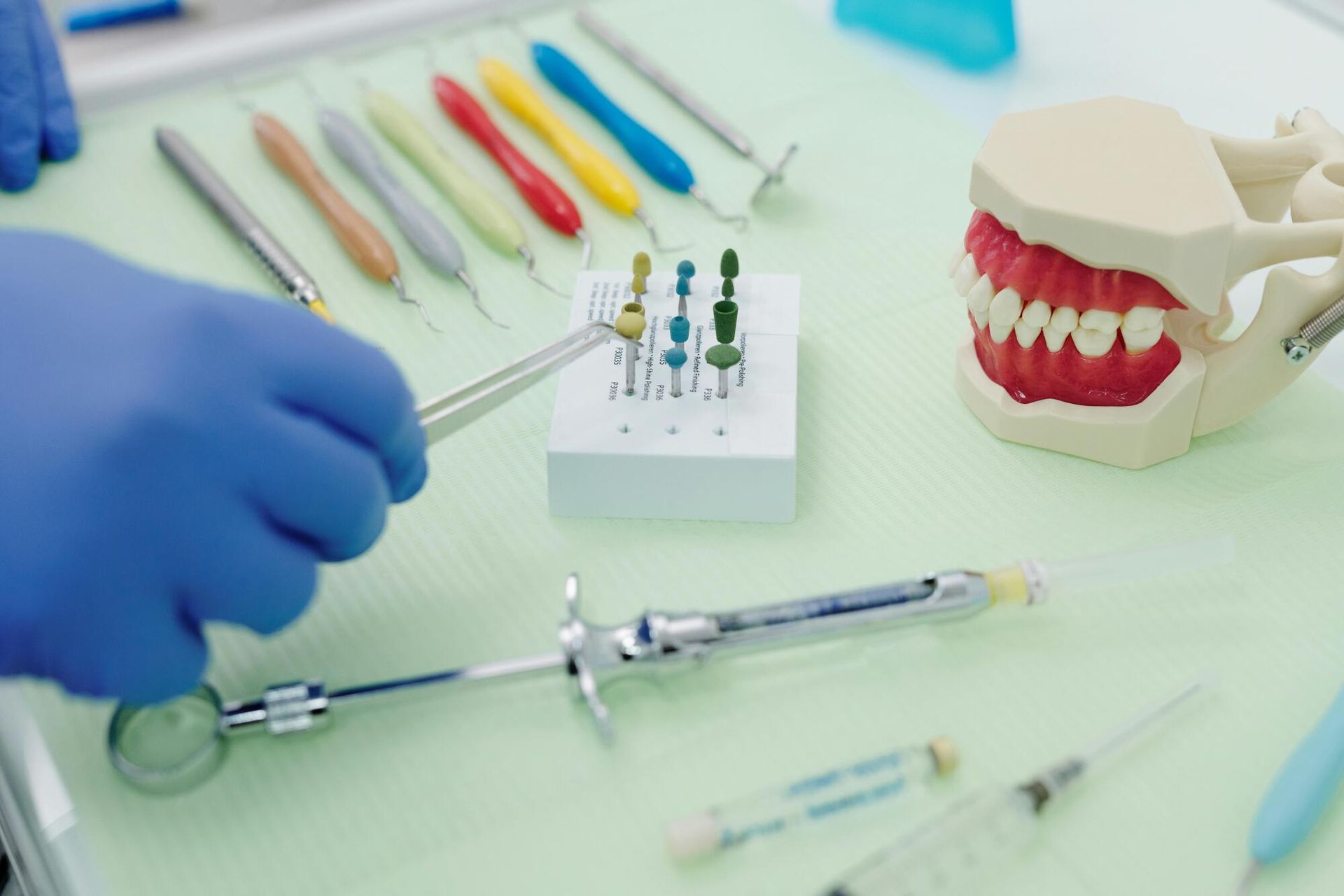Benefits of Dental Implants Over Traditional Dentures
Are you tired of slipping dentures or dealing with messy adhesives? Many people with missing teeth struggle to find a solution that feels natural and lasts.
While both dental implants and dentures replace teeth, one clearly outperforms the other in durability, comfort, and overall satisfaction.
Today, we're taking a closer look at dental implants vs dentures to see which option offers better functionality and long-term value!
Dental Implants vs Dentures: Core Differences
When you compare dental implants vs dentures, there are several clear differences. Each treatment works in its own way and affects your daily life, comfort, and long-term health. Here are three of the most noticeable ways they differ:
- How they fit and stay in place
- How they affect the jawbone
- How they feel and look over time
How They Fit and Stay in Place
Dentures rest on the gums and rely on suction or adhesive to remain in place. This can lead to slipping, especially while talking or eating.
Implants are placed in the jawbone, which makes them more stable. They don't move once they're healed. It means less worry and better function.
How They Affect the Jawbone
Dentures sit on the surface and do not support the bone underneath. Over time, the jawbone can shrink.
It alters the shape of the mouth and makes dentures more difficult to wear. Implants work like tooth roots. They keep the bone active and prevent it from breaking down. That's one of the biggest advantages of implants.
How They Feel and Look Over Time
Dentures can feel bulky, and they may not look as natural after a few years, especially if the jawbone changes shape. On the other hand, implants are fixed in place and feel like real teeth, and they match the shape and color of your natural smile.
When you compare dental solutions, many patients find implants look and feel better in the long run.
Functionality and Comfort in Daily Life
The way dental implants and dentures work each day can make a big difference in your comfort and confidence. These treatments don't just look different, they feel different. Especially when you talk, eat, or clean your teeth.
There are three main ways this shows up in daily life:
- Eating and chewing stability
- Comfort during speech and movement
- Daily cleaning and care routines
Eating and Chewing Stability
Dentures often shift when you chew, especially if the fit changes over time. Some foods become harder to eat, and meals can feel stressful.
Implants stay fixed in the jaw and don't move when you bite or chew. That means you can eat a wider range of foods without discomfort or worry. It's one of the most noticeable pros of dental implants.
Comfort During Speech and Movement
Loose dentures can click or slip when you speak. That can be frustrating or embarrassing, especially in group settings.
Implants feel more like natural teeth and don't shift while you talk. You can speak with ease, without thinking about your teeth moving around.
Daily Cleaning and Care Routines
Dentures must be removed and cleaned daily. Some require soaking overnight.
Implants are brushed just like real teeth. This can feel simpler and more natural.
For many people, this daily ease is one of the top benefits of dental implants. They don't interrupt your routine and don't need extra care beyond normal brushing and flossing. When you compare dental solutions for daily life, implants often provide a smoother and more reliable experience.
Durability and Long-Term Investment
When looking at dental implants vs dentures, long-term value matters. Many people want a solution that lasts, saves money over time, and needs as little upkeep as possible. There are three main points to consider when comparing how these options hold up in the years ahead:
- How long does each option typically last
- How often are repairs or replacements needed
- What kind of ongoing costs are involved
How Long Does Each Option Typically last
Dentures may need to be replaced every five to seven years. Over time, changes in the mouth can affect how they fit, even with regular adjustments.
Dental implants, on the other hand, can last decades. When properly cared for, some implants can last a lifetime. This is another key reason people choose them.
How Often Are Repairs or Replacements Needed
Dentures are more likely to wear down or break. They can chip, crack, or become loose. These problems result in more appointments and increased costs. Implants are much stronger.
Once the implant bonds with the bone, it becomes part of the structure of your mouth. The crown may eventually need to be replaced, but the implant post typically remains in place for the long term.
What Kind of Ongoing Costs Are involved
Dentures might seem less expensive at first. But when you add in repairs, refits, and replacements, the cost adds up. Cleaning products and adhesives can also become part of your monthly expenses.
Implants may cost more upfront, but their lower maintenance costs over time make them a smart choice for many people. When you consider the full picture, the advantages of implants start to stand out.
They offer fewer surprises and more lasting value. For anyone looking to compare dental solutions, durability and cost are two of the biggest factors.
Oral Health and Jawbone Preservation
When you lose a natural tooth, the bone under it begins to shrink. Dentures sit on top of the gums and don't touch the bone underneath in a way that keeps it active.
Over time, this can lead to changes in your bite and how your dentures fit. Dental implants work differently.
They are placed in the bone and act like tooth roots. The small bit of pressure they create helps keep the bone strong and steady.
Gaps from missing teeth can cause nearby teeth to shift out of place. It affects your bite and can lead to more dental issues.
Dentures do not stop this from happening. Implants fill those gaps and help hold the other teeth in position. This helps keep your whole mouth stable and working the way it should.
As the jawbone shrinks from missing teeth, your face may start to look sunken or older. Dentures won't stop that change.
Over time, they can even accelerate the process if the bone continues to wear away. One of the most significant benefits of dental implants is their ability to help maintain the shape of your face. They support the bone, which supports your features.
Aesthetic Results and Confidence Boost
Dentures can look good when new, but over time, they may lose their shape or start to look less realistic. The jawbone may shrink under the gums, which can change how dentures fit.
It can affect how your face looks, sometimes making the cheeks or mouth appear sunken. These changes can affect your comfort and confidence in social settings.
Dental implants are fixed in place and support the structure of your mouth. They don't move or shift when you talk or smile.
Each implant is custom-made to match the shape, size, and color of your natural teeth. The result often looks and feels just like your original smile. This is one of the most noticeable pros of dental implants.
Many people say they feel more at ease with implants than with removable dentures.
Who Should Choose Implants? Ideal Candidates
Not everyone is the right match for every treatment. When comparing denture alternatives, dental implants stand out for those who want something permanent and low-maintenance. However, this option depends on several health and lifestyle factors.
Overall Health And Bone Strength
Dental implants need a strong foundation. This means the jawbone must be healthy and thick enough to hold the implant in place.
Some people may require additional care before treatment, such as a bone graft. Others may not qualify due to certain medical conditions. Your dentist will check your bone and gum health before deciding.
Willingness To Care for The Implants
Although implants are easier to care for than dentures, they still require attention. Brushing, flossing, and regular dental visits are part of the routine.
People who take care of their teeth are more likely to get long-lasting results. Implants won't work well for someone who isn't ready to follow basic care steps.
Long-Term Goals for Comfort and Ease
Some people want a quick fix, while others care more about long-term comfort. If someone's goal is to avoid slipping dentures or constant repairs, implants may be a better fit.
They offer stability, better support, and fewer long-term costs.
The Best Denture Alternatives
When comparing dental implants vs. dentures, the difference in comfort, function, and long-term value is clear.
At Dr. Rosado & Associates, we treat every patient like family. Located in Westchester, Miami, our team has proudly served generations from across the city for over 30 years. From cleanings and cosmetic care to implants and smile makeovers, we offer top-quality dental treatment in a welcoming, informative setting you can trust.
Get in touch today to find out how we can help with your cosmetic dentistry needs.













